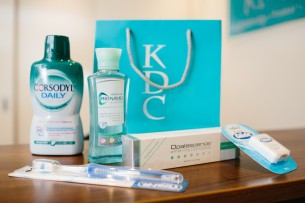Oral disease can cause impairment with speaking and communicating effectively. It can impair chewing, eating and tasting our food, as well as swallowing and hence our digestion. And it can stop us smiling and harm our general confidence.
Healthy teeth and gums allow us to form our speech properly and communicate with our peers and society in a comfortable and confident way. You may notice people with missing teeth may not be forthcoming in chatting and getting involved with others. They may also not wish to socialise and will have difficulty forming certain words properly.
Where we are unable to effectively chew our food properly from sore gums and/or teeth, it means we are not able to enjoy our eating experience and appreciate different flavours, as well as hindering the correct and healthy process of digestion.
We should never underestimate the social impact of a healthy smile
I’ve lost count of patients who have attended my clinic after many years of chronic problems in their mouth only to be surprised when we link this to their poor digestion and stomach problems, from acid reflux to stomach ulcers as well as more chronic stomach conditions. Swallowing properly chewed and broken down food is an essential part of this process.
 We live in an evermore aesthetic society, especially with the increasing accessibility of images on social media ripe for judgment. Several recent studies have affirmed the importance of a clean white healthy smile and the impact this has on people’s perceptions. Think of that important job interview or a first date, what does a clean healthy smile with fresh breath convey? What about the opposite scenario?
We live in an evermore aesthetic society, especially with the increasing accessibility of images on social media ripe for judgment. Several recent studies have affirmed the importance of a clean white healthy smile and the impact this has on people’s perceptions. Think of that important job interview or a first date, what does a clean healthy smile with fresh breath convey? What about the opposite scenario?
You may have recently watched the two-part BBC TV series The Truth About Your Teeth in which a mini public survey was conducted. The same female model was portrayed with “good” white teeth and healthy gums and then with poorer yellower teeth with gums that appeared to be diseased. The results were unanimous, with the public finding the model with good teeth not only more attractive, but also more trustworthy, intelligent and kinder. We should, therefore, never underestimate the social impact of a healthy smile.
There are now clear clinical links between:
- Gum disease, in particular the bacteria that flourish in it, and heart disease including strokes
- Gum disease and diabetes; in some instances we are able to ascertain patients who may be borderline diabetic just from the condition of their gums
- Bacterial gum disease and prematurely born babies or babies of lower birth weight
- Our diet and lifestyle, in particular alcohol consumption and smoking, and the higher incidence of oral cancers being diagnosed and treated country-wide.
How can we take control and maintain good oral health?
- Nightly flossing and brushing thoroughly for the recommended allotted time of two minutes
- Regular oral health, including head and neck checks, which a quality dental surgeon should carry out at every dental visit
- Regular visits to a well-qualified hygienist who can measure your “gum scores”, show you what areas in your mouth need more attention and help you improve your oral hygiene technique daily; this should be tailor-made to you as each mouth is different
- Positive dietary and lifestyle changes discussed in detail with your dentist and/or healthcare professional.
Given that more than half of all UK adults will experience early or advanced gum disease at least once in their lives, what are the common signs or symptoms that something is wrong? Here is what you should look out for:
- Bleeding gums while you brush
- Changes in your breath; someone close may be brave enough to say that your breath smells bad if you do not sense it yourself
- Movement in any of your teeth, no matter how small
- Pain or soreness in the gums while chewing or cleaning
- Any lumps or swellings in the gum area
- An odd or metallic taste in your mouth
- Changes in the colour of your gums, especially any darker red areas or white patches visible to the naked eye.
If you experience any of these symptoms seek dental advice and have things thoroughly checked. Although they may be indicative of developing gum disease, they can also be warnings of other oral pathology, such as tumours or cysts developing around the gums and teeth.
There is no reason, in our modern and technologically advancing world, why common oral ailments cannot be treated effectively by a good dental-care professional, ensuring good oral health so that we can hold on to our teeth for the rest of lives.
Gum disease is treatable and, where patients’ mouths are well maintained, can result in a good long-term outcome. Treatment now is advanced and pain free. Gone are the days when patients were running for the hills to avoid seeing the dentist. Techniques are more effective, with better and more predictable outcomes.
So as for that thorough check-up? Stop putting it off and take control of your oral health today. By doing so you may avert something far more serious.
Dr Ayee-Marie McGrath, BDS MSc
Owner of www.knightsbridgedental.co.uk

